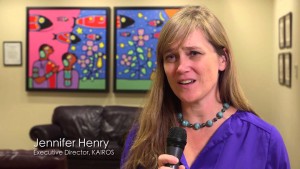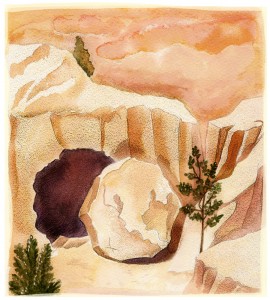Impossible Hope: Excerpt from a Sermon on Ezekiel 37: 1-14 and John 11: 1-44 – by Jennifer Henry

Spirited Reflection – April 13, 2014
There are few things as grim as the image of a valley of dry bones. In me it invokes thoughts of death, most certainly, but also desecration. I am reminded of the devastating harm we can do to one another, our capacity to violate dignity to the end and even beyond.
In my friend Ian Sowton’s poem “Dry Bone Valley” he speaks of the desolation of Rwanda and Darfur. The dilemma is that touchstones in modern and ancient history are too numerous to recount. The horror of this image is palpable. But it doesn’t end there…
“Suddenly there was a noise, a rattling” and then bones knit together with sinews, flesh and skin cover them, breath and spirit flow into them (37:7-8). “They lived, and stood on their feet, a vast multitude” (37:10). “I will put my spirit within you that you shall live, and I shall place you on your own soil,” (37:14). For the prophet Ezekiel, there is something about our God that brings life and possibility and home even in the bleakest and most despairing time. There is something in the heart of our God that offers impossible hope.
There are few things as despairing as a senseless death of a young person–the unexpected death of one deeply loved as “Jesus loved Martha and her sister and Lazarus,” (11:5). When the ones we live for suddenly die, families are shaken to their core, friends struggle for meaning. The pain is palpable. But it doesn’t end there…
 “He cried with a loud voice Lazarus come out! And the dead man came out, his hands and feet bound with strips of cloth, his face wrapped in a cloth and Jesus said to them ‘unbind him and let him go’” (11:43-44). For the Gospel writer John, there is something about Christ that brings life and possibility and freedom in the hardest, the most despairing time. There is something in the heart of our God that offers impossible hope.
“He cried with a loud voice Lazarus come out! And the dead man came out, his hands and feet bound with strips of cloth, his face wrapped in a cloth and Jesus said to them ‘unbind him and let him go’” (11:43-44). For the Gospel writer John, there is something about Christ that brings life and possibility and freedom in the hardest, the most despairing time. There is something in the heart of our God that offers impossible hope.
Neither Ezekiel and nor John deny a reality of death and desolation, injustice and pain, but neither to do they obscure or limit the promises of God. The message is clear: transformation is God’s signature. No matter how bleak, how hard, how impossible, new life—justice, peace, dignity—can break through.
We are called to conspire with God who makes the impossible possible. To act towards that which we believe. However imperfect or impartial our efforts, each step forward in justice becomes a witness to that impossible hope. KAIROS seeks to support these steps whether by the churches as institutions, with the strength of their collective witness, or by the church as spirited movement of people of faithful action across the country.
As we approach Easter, let us renew our commitment to the impossible hope of God. These are the closing words from the poem “Dry Bone Valley”: Plant something new in us, reassemble the strewn backbones of our resolve, breathe prophecy into us so that blade by blade, tuft by tuft, we may animate these Lenten slopes with living green of Easter hopes.



